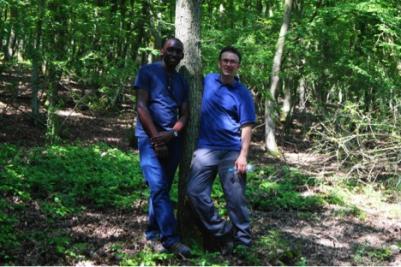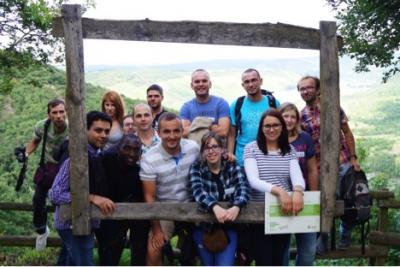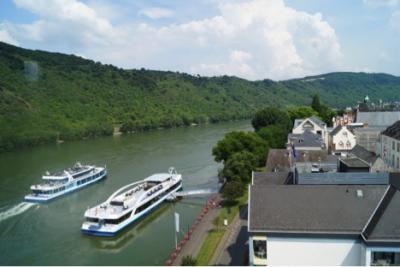Two SENRGy distance-learning students attend EuroCoppice Training School in Germany
Training Schools are one element of COST (European Cooperation in Science and Technology) Actions, which are bottom-up science and technology networks initiated through a range of workshops, conferences, training schools, short-term scientific missions (STSMs), and dissemination activities. Training Schools are often organised as key elements of COST Actions and can provide unique training opportunities to MSc and PhD students from across Europe who share an interest in the COST Action subject matter.
The COST Action FP1301 – EuroCoppice held its 4th Training School in the beautiful Rhine Valley of Germany (17th-23rd July 2016), hosted by the Albert-Ludwigs University of Freiburg in cooperation with the Forestry District Boppard in Rhineland-Palatinate. The topic was ‘Coppice Management, Biodiversity and Services’ and two of our Bangor University distance learning students, Chris Bates (MSc Forestry) from Chesterfield, Derbyshire UK and Matia Agaba (MSc Tropical Forestry) from Kampala, Uganda, were successful in their applications to join a select group of 17 other students on the week-long Training School.
 Matia Agaba on the left (MSc Tropical Forestry) and Chris Bates on the right (MSc Forestry) in the forest collecting data during the Training School in Boppard, Germany. Credit: Matia Agaba, July 2016.
Matia Agaba on the left (MSc Tropical Forestry) and Chris Bates on the right (MSc Forestry) in the forest collecting data during the Training School in Boppard, Germany. Credit: Matia Agaba, July 2016.
Agaba and Chris were asked a number of questions about their experiences on the Training School in the hope of sharing some of their experiences and hopefully inspiring others to take advantage of other similar opportunities in the future.
What was the most important lesson you took from the training school?
Chris: To be open to opportunities, and not let habit, or common practices in forestry particular to your own area or experience, blinker you to alternative methods, which might be better suited to achieving management goals.
Agaba: This course was a real eye opener since I haven’t had much experience with European or temperate forests. My take home message is that coppice management can be a sustainable option, providing both fuelwood and timber for sale without heavily degrading the landscape.
What was the highlight of the training school for you?
Chris: Very hard to say, as there were many; meeting the huge range of individuals with a variety of expertise, experiences and backgrounds was certainly an inspiration. This gave a wide perspective not only of forestry but also the political and cultural backgrounds behind various policies and management techniques. I also had my first encounter with a mature and healthy Sorbus domestica (service tree) growing in the wild (one of the best specimens found in the area), which we discovered whilst surveying a site during the training school.
Agaba: The course was well organized with a very packed program, including both theory and practical work in equal amounts. It was particularly interesting to work on the methodology, go to the forest and collect data, analyze it and present it within one week. All the trainers were really enthusiastic and gave very good input at all stages of the training. Our local hosts were also very informative giving detailed information about their forest management and they were very “attached” to and proud of the forests in Boppard. Another thing was the diversity of trainees; in total, we had 15 different nationalities from a wide range of backgrounds, at different stages of their careers and education, yet bound by a shared passion for forestry. It was very inspiring how we all enthusiastically worked together even in the very hot weather and until late in the evenings.
Did you have any preconceptions about the use of coppice systems in forestry before the training school and if so, have these changed?
Chris: Before attending the course I had the impression that coppicing, other than short rotation coppice, was largely a niche market with limited economic potential, and was mainly restricted to cultural and conservation concerns. I discovered that this was not the case; the opportunities are more dynamic and complicated. What stood out the most was the potential for large economic returns from the cultivation of rare species, which have been neglected and likely aided in their survival through coppicing; for example Sorbus domestica can fetch prices of over €1000/ m3, making it worth far more than oak which is currently valued at around €40/ m3. If the most appropriate species are promoted for each particular situation then the economic viability of coppice stands with standards could be increased considerably. This is especially true if more attention is placed on high value timber, as was exemplified by the case studies investigated in the training school.
Agaba: My only preconception was that I thought these coppice forests were only managed for fuelwood production. I learnt a lot about the forests in Germany and I was surprised that there are actually canopy trees that are coppiced and commercially harvested for timber. There is also special emphasis being put on the promotion of biodiversity in coppice forests. There is research being conducted on how best to improve the management of these rare species by two gentlemen (Patrick Pyttel and Jörg Kunz) who talked with us and also accompanied us to the forest to collect data about rare species.
What advice would you give to a fellow student who is considering whether to attend a COST training school?
Chris: For those who are interested in attending a COST Training School I would recommend that they apply. Not only is it a great learning opportunity, it could also lead to new avenues of interest and future collaborative work which hitherto may not have been feasible on such an international scale. It is great way to meet other people involved in forestry research throughout Europe and beyond.
Agaba: I would definitely recommend students to apply for these COST Training Schools. There are very many benefits in attending them. First, it is an opportunity to see new places, for me it was a privilege seeing a different kind of forest, learning about it and getting motivated to promote such practices in my home country Uganda. It is also an avenue for meeting new students from other places and these could even be future research partners and colleagues.
 Group picture of trainees in the field during the Training School in Boppard, Germany. Credit: Matia Agaba, July 2016.
Group picture of trainees in the field during the Training School in Boppard, Germany. Credit: Matia Agaba, July 2016.
James Walmsley, course director for the distance learning forestry programmes, said “I’m so pleased that Agaba and Chris used their initiative to apply for and then make the time to attend this great Training School. They have clearly benefited hugely from the experience. Studying forestry at Bangor University really does afford our students a wealth of fantastic opportunities beyond the scope of specific degree programmes. Agaba and Chris clearly illustrate this, as do many other recent experiences of our students who have enjoyed educational trips to Canada, Poland, Switzerland, Comoros, Uganda and Vietnam, to name just a few.”
 The Training Course took place in the Rhine Valley, a place of dense forests and beautiful scenery. Credit: Matia Agaba, July 2016.
The Training Course took place in the Rhine Valley, a place of dense forests and beautiful scenery. Credit: Matia Agaba, July 2016.
Publication date: 27 July 2016
